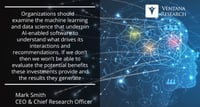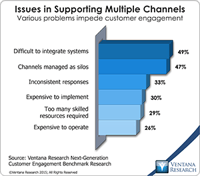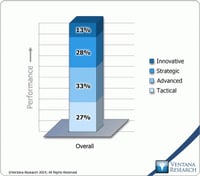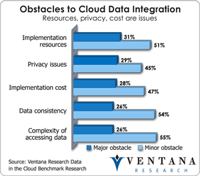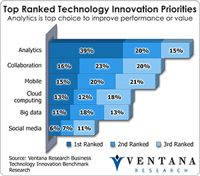We now are well beyond the year depicted in 2001: A Space Odyssey, a cinematic perspective on the future of artificial intelligence in which HAL 9000, a computer, is able to simulate human behavior and control machines. Anyone reviewing the past two years of marketing around AI in the business technology industry can be forgiven for believing that we have arrived at the futuristic state Stanley Kubrick imagined. We have not.
Read More
Topics:
Big Data,
Data Science,
Mobile,
Customer Analytics,
Customer Engagement,
Customer Experience,
Machine Learning,
Mobile Technology,
Wearable Computing,
business intelligence,
Analytics,
Cloud Computing,
Collaboration,
Customer Service,
Data Governance,
Data Integration,
Data Preparation,
Internet of Things,
Contact Center,
Information Optimization,
Digital Technology,
Machine Learning and Cognitive Computing,
Cybersecurity,
Billing and Recurring Revenue,
Workforce Optimization,
collaboration for business
We are have arrived at the May 25, 2018 date when the European Union’s General Data Privacy Regulations (GDPR) become enforceable, following what has been a two-year transition period. Companies were given this time to put in place reasonable measures and the systems necessary to support the legislation’s wide-ranging personal data privacy requirements, which apply to any organization with more than 250 employees that serves EU citizens. While this regulation will apply in the EU, it has...
Read More
Topics:
Big Data,
Data Science,
Mobile,
Sales,
Customer Analytics,
Customer Engagement,
Customer Experience,
Marketing,
Analytics,
Business Intelligence,
Cloud Computing,
Collaboration,
Data Governance,
Data Integration,
Data Preparation,
Internet of Things,
Contact Center,
Digital Technology,
Digital Marketing,
Digital Commerce,
Cybersecurity,
Billing and Recurring Revenue,
collaboration for business,
mobile marketing
Advancing the potential of any business requires continuous improvement in the processes and technology that support it. Many companies have embraced attempts at a digital transformation, and it’s become a goal to which organizational resources and budgets have been dedicated around the globe.
Read More
Topics:
Big Data,
Data Science,
Mobile,
Sales,
Customer Analytics,
Customer Engagement,
Customer Experience,
Human Capital Management,
Machine Learning,
Marketing,
Marketing Performance Management,
Mobile Technology,
Office of Finance,
Wearable Computing,
Analytics,
Business Intelligence,
Cloud Computing,
Collaboration,
Customer Service,
Data Governance,
Data Integration,
Data Preparation,
Internet of Things,
Contact Center,
Information Optimization,
Product Information Management,
Digital Technology,
Digital Marketing,
Digital Commerce,
Operations & Supply Chain,
Machine Learning and Cognitive Computing,
Pricing and Promotion Management,
Cybersecurity,
Billing and Recurring Revenue,
Workforce Optimization,
collaboration for business
Cloudera provides database and enabling technology for the big data market and overall for data and information management. As my colleague David Menninger has written, the big data and information management technology markets are changing rapidly and require vendors to adapt to them. Cloudera has grown significantly over the last decade and now has approximately 1,000 customers and provides support and services in countries around the world. Its product and technology strategy is to provide a...
Read More
Topics:
Big Data,
Data Science,
Machine Learning,
Analytics,
Business Intelligence,
Cloud Computing,
Data Governance,
Data Integration,
Data Preparation,
Internet of Things,
Cognitive Computing,
Information Optimization,
Digital Technology,
Cybersecurity
This has been a dramatic year for Informatica, a major provider of data integration software. In August it was acquired and taken private by Permira funds and Canada Pension Plan Investment Board for about US$5.3 billion. This change was accompanied by shifts in its management. CEO Sohaib Abbasi became chairman and now has left, and many executives were replaced while Anil Chakravathy became CEO from being the Chief Product Officer. The new owners appear to have shifted the company’s strategic...
Read More
Topics:
Big Data,
Data Quality,
Master Data Management,
MDM,
Operational Performance Management (OPM),
Cloud Computing,
Data Integration,
Data Management,
Data Preparation,
Governance, Risk & Compliance (GRC),
Informatica,
Uncategorized,
Business Performance Management (BPM),
Information Management (IM),
Information Optimization,
Risk & Compliance (GRC)
Big data has great promise for many organizations today, but they also need technology to facilitate integration of various data stores, as I recently pointed out. Our big data integration benchmark research makes it clear that organizations are aware of the need to integrate big data, but most have yet to address it: In this area our Performance Index analysis, which assesses competency and maturity of organizations, concludes that only 13 percent reach the highest of four levels, Innovative....
Read More
Topics:
Big Data,
Operational Performance Management (OPM),
Business Analytics,
Business Intelligence,
CIO,
Cloud Computing,
Data Integration,
Business Performance Management (BPM),
Information Applications (IA),
Information Management (IM),
Strata+Hadoop
At the Informatica World 2014 conference, the company known for its data integration software unveiled the Intelligent Data Platform. In the last three years Informatica has expanded beyond data integration and now has a broad software portfolio that facilitates information management within the enterprise and through cloud computing. The Intelligent Data Platform forms a framework for its portfolio. This expression of broad potential is important for Informatica, which has been slow to...
Read More
Topics:
Big Data,
Master Data Management,
Operational Performance Management (OPM),
Business Analytics,
Business Intelligence,
CIO,
Cloud Computing,
Data Integration,
Data Management,
Informatica,
Business Performance Management (BPM),
Customer Performance Management (CPM),
Financial Performance Management (FPM),
Information Applications (IA),
Information Management (IM),
Information Optimization,
Product Information Management,
Sales Performance Management (SPM),
Supply Chain Performance Management (SCPM),
Workforce Performance Management (WPM),
application
Information management is important to every line of business that seeks to improve its business processes and decision-making. In response to pressure from those departments, CIOs and IT organizations must examine whether they have focused enough on the I for information and not just the T for technology, and if they have not, commit to taking this responsibility more seriously than in the past. Informatica is one vendor that realizes the potential of its information beyond just data...
Read More
Topics:
Data Quality,
Master Data Management,
Operational Performance Management (OPM),
PowerCenter,
Analytics,
Business Analytics,
CIO,
Cloud Computing,
Data Integration,
Information Applications,
Information Management,
Business Performance Management (BPM),
Information Applications (IA),
Information Management (IM),
Information Optimization,
Vibe
Businesses continue to try to increase productivity and simplify tasks in order to use their time smarter. Our recent business technology innovation research found that, when it comes to analytics, 44 percent of organizations spend the most time on data-related tasks. With lack of resources being the largest issue impeding the adoption of technology, IT must operate efficiently while getting business the data it needs on a timely basis. Scribe Solutions has a business-centric data integration...
Read More
Topics:
Microsoft,
Marketo,
On24,
Operational Performance Management (OPM),
SilverPop,
Business Intelligence,
Data Integration,
Information Management,
Business Performance Management (BPM),
Customer Performance Management (CPM),
FinancialForce,
Information Applications (IA),
Information Management (IM),
Information Optimization,
Intuit Quicken,
IT Performance Management (ITPM),
Sales Performance Management (SPM),
Scribe Software,
Xactly
I recently attended the annual SAS analyst summit to hear the latest company, product and customer growth news from the multi-billion-dollar analytics software provider. This global giant continues to grow its business and solutions to help with fraud prevention, marketing and risk. It lets users apply its analytic and statistical technology in practical applications for business. SAS can meet midsized businesses’ demand with packaging and pricing to ensure it is not seen as only affordable to...
Read More
Topics:
Big Data,
Predictive Analytics,
SAS,
Fraud,
GRC,
Operational Performance Management (OPM),
Analytics,
Business Analytics,
Business Intelligence,
CIO,
Cloud Computing,
Data Integration,
Governance, Risk & Compliance (GRC),
Information Management,
Operational Intelligence,
Business Performance Management (BPM),
Customer Performance Management (CPM),
Financial Performance Management (FPM),
Information Applications (IA),
Information Management (IM),
Risk,
Sales Performance Management (SPM)
